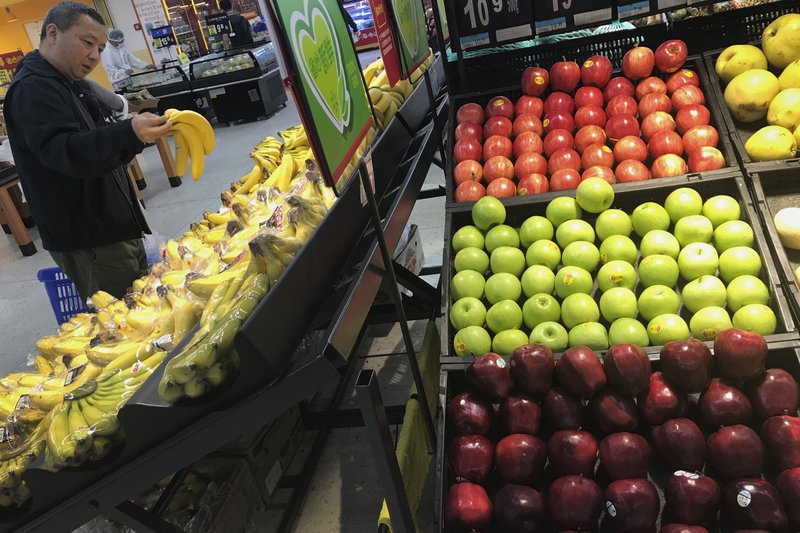BEIJING -- China raised import duties on a $3 billion list of U.S. pork, apples and other products Monday in an escalating dispute with Washington over trade and industrial policy.
The government of President Xi Jinping said it was responding to a U.S. tariff increase on steel and aluminum. But that is just one facet of sprawling tensions over a state-led economic model that Washington, Europe and Japan complain hampers market access, protects Chinese companies and subsidizes exports in violation of Beijing's free-trade commitments.
Already, companies are looking ahead to a bigger fight over U.S. President Donald Trump's approval of higher duties on up to $50 billion of Chinese goods in response to complaints that Beijing steals technology or pressures foreign companies to hand it over.
Forecasters say the impact of Monday's move should be limited, but investors worry the global recovery might be set back if other governments respond by raising import barriers.
The move was no surprise, but on Monday the news sent U.S. stocks tumbling, and the main stock market indexes in Tokyo and Shanghai ended the day down.
Many trade analysts suggested that the Wall Street sell-off may be an overreaction.
China's swift but measured retaliation to the U.S. steel and aluminum tariffs is meant to show "that it will not be pushed around but that it does not want a trade war," said Amanda DeBusk, chair of the international trade department at the law firm Hughes Hubbard & Reed. "It is possible for the countries to pull back from the brink."
"It seems to be pretty measured and proportional," agreed Wendy Cutler, a former U.S. trade official who is now vice president at the Asia Society Policy Institute. "They didn't seem to overreach, and they didn't hit our big-ticket items like planes and soybeans."
The tariffs "signal a most unwelcome development, which is that countries are becoming protectionist," said economist Taimur Baig of DBS Group. But in commercial terms, they are "not very substantial" compared with China's $150 billion in annual imports of U.S. goods, he said.
Monday's tariff increase will hit American farm states, many of which voted for Trump in 2016.
Beijing is imposing a 25 percent tariff on U.S. pork and aluminum scrap, and 15 percent on a range of products: sparkling wine; steel pipe used by oil and gas companies; fresh and dried fruits, including apples and grapes; nuts, including walnuts; and ginseng.
American farm exports to China in 2017 totaled nearly $20 billion, including $1.1 billion of pork products.
There was no indication whether Beijing might exempt Chinese-owned American suppliers such as Smithfield Foods, the biggest U.S. pork producer, which is ramping up exports to China.
Shares of Tyson Foods Inc. took a hit as China's new tariffs cause fears of a U.S. pork pileup.
The 25 percent duty on pork comes just after government data showed that the American hog herd on March 1 reached a seasonal all-time high. The tax may cause U.S. meat supplies to "back up meaningfully" and cause pork prices to fall, dragging on chicken and beef, Tim Ramey, an analyst at Pivotal Research Group, said Monday in a report. He lowered his stock rating on Tyson to "sell."
Tyson fell as much as 7.1 percent Monday in New York before closing down 4.55 percent at $68.64. The company declined to comment on the tariffs. Neil Dierks, chief executive officer of the National Pork Producers Council, said the group is "disappointed" about the tariff and hopes it will be short-lived, according to an online statement.
Combined with sales to Hong Kong, China was the second-largest destination for U.S. pork exports by volume last year, industry data show. Mexico was the largest.
While China is a "volatile" buyer, the country is the largest market for pork byproducts such as livers and kidneys and there are few alternative destinations, Jeremy Scott, an analyst at Mizuho Securities, said in a report. "Healthy export flows, particularly of offal product, is necessary to clear the supply ramp from the new pork packing capacity coming online this year," he said.
The U.S. tariff increase "has seriously damaged our interests," China's Finance Ministry said in a statement.
"Our country advocates and supports the multilateral trading system," it said. China's tariff increase "is a proper measure adopted by our country using World Trade Organization rules to protect our interests," the statement said.
White House spokesman Sarah Huckabee Sanders said Monday on the television show Fox and Friends that Trump was "going to fight back and he's going to push back."
Deputy press secretary Lindsay Walters said China's "subsidization and continued overcapacity" were the root cause of low steel prices that have hurt U.S. producers.
"Instead of targeting fairly traded U.S. exports, China needs to stop its unfair trading practices which are harming U.S. national security and distorting global markets," Walters said.
The United States buys little Chinese steel and aluminum, but analysts said Beijing had been certain to retaliate to the U.S. tariffs, partly to show its toughness ahead of possible bigger disputes.
Chinese officials have said Beijing is willing to negotiate, but in a confrontation will "fight to the end."
Information for this article was contributed by Catherine Lucey, Darlene Superville, Yu Bing and Paul Wiseman of The Associated Press; and by Megan Durisin of Bloomberg News.
Business on 04/03/2018
